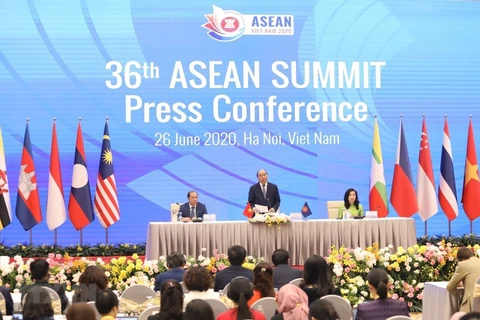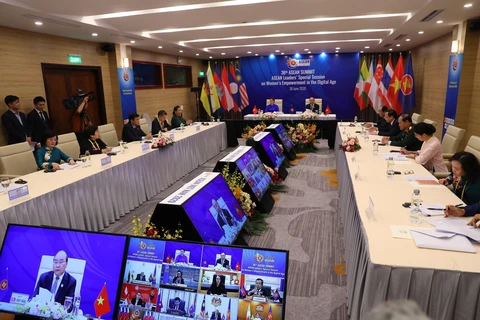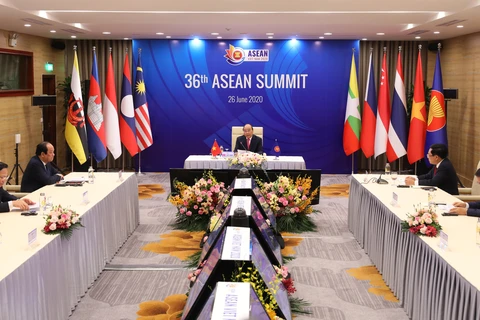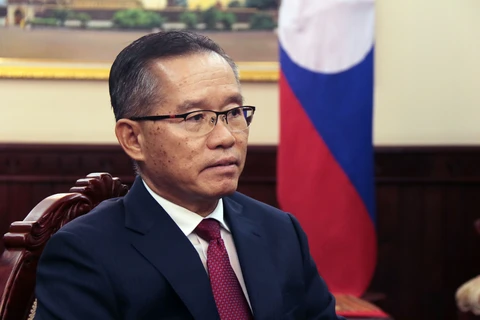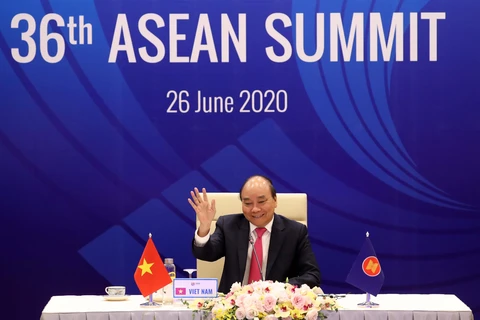 The ASEAN Leaders' Interface with Representatives of ASEAN Business Advisory Council as part of the teleconferenced 36th ASEAN Summit on June 26 (Photo: VNA)
The ASEAN Leaders' Interface with Representatives of ASEAN Business Advisory Council as part of the teleconferenced 36th ASEAN Summit on June 26 (Photo: VNA) Hanoi (VNA) - The following is the full text of the ASEAN Plan of Action on Strengthening ASEAN Economic Cooperation and Supply Chain Connectivity in Response to the COVID-19 Pandemic, which was adopted at the teleconferenced 36th ASEAN Summit on June 26.
HANOI PLAN OF ACTION ON STRENGTHENING ASEAN ECONOMIC COOPERATION AND SUPPLY CHAIN CONNECTIVITY IN RESPONSE TO THE COVID-19 PANDEMIC
This Plan of Action implements the Declaration of the Special ASEAN Summit on the Coronavirus Disease 2019 (COVID-19) adopted by the ASEAN Heads of State/Government at a Special ASEAN Summit on 14 April 2020, in particular, the mandate to implement the ASEAN Economic Ministers’ Statement on Strengthening ASEAN’s Economic Resilience in Response to the Outbreak of COVID-19, issued on 10 March 2020, and to explore a temporary arrangement to preserve supply chain connectivity during the duration of the COVID-19 pandemic.
This Plan of Action demonstrates ASEAN’s determination to work closely to identify and address trade disruptions, with ramifications, on the flow of essential goods, including food, medicines, and medical and other essential supplies in the region. This is part of concerted efforts to not only contain and mitigate the economic impact of the COVID-19 pandemic on the region but also to strengthen supply chain connectivity to make supply chains more resilient and less vulnerable to similar challenges in the future.
This Plan of Action will be implemented in accordance with the rights and obligations of the ASEAN Member States under the General Agreement on Tariffs and Trade (GATT) 1994 and other WTO covered Agreements, the ASEAN Economic Community Blueprint 2025 and other ASEAN internal Agreements, such as the ASEAN Trade in Goods Agreement, the ASEAN Trade Facilitation Framework, the Master Plan on ASEAN Connectivity (MPAC) 2025, and other relevant ASEAN Agreements.
This Plan of Action does not create rights or obligations under international law.
I. AREAS OF COOPERATION
ASEAN Member States will ensure the smooth flow of essential goods, including food, medicines, and medical and other essential supplies associated with combating the COVID-19 pandemic and facilitate timely information sharing amongst the ASEAN Member States with regard to trade-related measures on these essential goods and supplies. ASEAN Member States will also facilitate information exchange on the best practices of Member States in handling COVID-19, and to undertake initiatives as well as risk mitigation efforts to prevent the further spread of infectious diseases including COVID-19.
1.1 Refrain from imposing unnecessary non-tariff measures during the COVID-19 pandemic. This would include the consideration to not apply against any ASEAN Member State export prohibition or restrictions within the meaning of Article XI of the GATT 1994 to essential goods, including food, medicines, and medical and other essential supplies, for the purpose of combating the COVID-19 pandemic, except as provided under Article XI:2 (a) GATT and other WTO provisions.
1.2 Promptly inform all ASEAN Member States of any trade-related measure, through the ASEAN Secretariat, including the application of export prohibition or restriction, and/or the removal of export prohibition or restriction on essential goods, including food, medicines, and medical and other essential supplies if necessary, so as to ensure local needs and to protect public health in the context of the pandemic as soon as practicable. Also, to promptly publish and update such trade-related measures for transparency.
1.3 Enhance cooperation amongst ASEAN Member States to ensure security of essential goods, including medical, food and other essential supplies in ASEAN by – on a best endeavour basis – informing all other ASEAN Member States as soon as practicable in the event of surplus production.
1.4 Promote sharing of information and best practices in handling the pandemic, business consultation support, and public-private sector collaboration efforts to respond to challenges that economic and business sectors in the region have faced.
1.5 Facilitate the smooth flow and transit of essential goods, including food, medicines, and medical and other essential supplies bound for the other ASEAN Member States through their respective land entry points, sea and air ports, including transit and transhipment points while ensuring compliance with the regulations of each ASEAN Member State on safety standards and quality for those essential goods.
1.6 Encourage dialogue between local government authorities of provinces of ASEAN Member States sharing borders to discuss solutions for customs clearance of essential goods, including food, medicines, and medical and other essential supplies while ensuring compliance of preventive measures against COVID-19 with national regulations.
1.7 Expedite release of all essential goods, including food, medicines, and medical and other essential supplies at all land entry points, sea and air ports, including adopting or maintaining, where practicable, the procedures on facilitating customs clearance and procedures allowing for the early and digital submission of import documentation and other required information, allowing for the use of electronic means, to the extent allowed by laws and regulations of each ASEAN Member State, for purposes of commencing processing prior to the arrival of the products.
1.8 Endeavour to abide by the:
i. World Health Organization’s (WHO) International Health Regulations (IHR) 2005 to allow free pratique to cargo ships – i.e. the permission to enter a port, discharge or load cargo or stores; and
ii. International Maritime Organization’s (IMO) Statement on 19 March 2020 to ensure that commerce by sea is not unnecessarily disrupted, by taking a practical and pragmatic approach to maintain the ability for shipping services and seafarers to deliver vital goods, including medical supplies and foodstuffs.
1.9 Support the International Civil Aviation Organization’s (ICAO) COVID-19 Declaration adopted on 9 March 2020, and endeavour to facilitate entry, transit and departure of air cargo containing the products classified as essential goods, including food, medicines, and medical and other essential supplies.
1.10 Intensify consultations with a view to addressing the implementation of this Plan of Action for better understanding of the measures adopted on essential goods, including food, medicines, and medical and other essential supplies for the purpose of combating COVID-19.
1.11 Facilitate and promote cooperation for the production of and access to medicines and vaccines used for COVID-19 medical treatment, using appropriate TRIPS flexibilities, to protect public health from negative impacts of the pandemic; be willing and ready to share with other AMS the supply sources of raw materials for production of the medicines and vaccines used for COVID-19 treatment, when possible.
1.12 Strengthen collaboration/communication among ASEAN Member States to easily address issues on cross-border movements of essential goods, including medical, food and other essential supplies.
1.13 Foster cooperation among ASEAN Member States to ensure regional financial safety nets and financial stability as well as to mitigate the impacts of the pandemic on regional economy and finance.
II. STRENGTHENING SUPPLY CHAIN CONNECTIVITY
ASEAN Member States will ensure that the response to the COVID-19 pandemic is not only for the short-term. The COVID-19 pandemic has exposed the vulnerability of supply chains in the regions. Therefore, efforts should also be geared towards strengthening supply chain connectivity in the long-term.
2.1 Collaborate with external and development partners to strengthen regional and global supply chain resilience and sustainability including the promotion of local currency settlement to enhance trade and direct investment flows in the region, and to be less vulnerable to internal and external shocks similar to the COVID-19 pandemic.
2.2 Leverage on technologies to put in place a robust mechanism for regional information sharing and coordination in responding to economic challenges such as the COVID-19 pandemic.
2.3 Encourage sharing of information and best practices on new technologies, systems or mechanisms adopted to facilitate trade such as online platforms, streamlining of processes, implementation of programs or policies in support to traders, importers and suppliers to ensure the smooth flow of essential and critical goods and services.
2.4 Build on existing trade facilitating platforms in ASEAN to promote and support supply chain connectivity and ensure the unimpeded flow of goods and services in supply chains, as well as to increase regional resilience through various efforts, including promoting regional food security and energy security and facilitating the environment for the possibility of the shifting of production business models.
2.5 Take proactive action in enabling an effective trade facilitation to ensure the flows of goods amongst ASEAN Member States and intensify efforts to address barriers to the smooth flow of essential and critical goods, including food, medicines, and medical and other essential supplies, and services.
2.6 Strengthen engagement with stakeholders such as the private sector by having them as significant partners in strengthening regional supply chains, to instil investment confidence, promote business opportunities, and strengthen supply chain connectivity.
2.7 Promote the use of science, technology and innovation, digital economy, and provide mechanisms to facilitate customs clearance and processing to allow businesses, especially the micro, small and medium enterprises (MSMEs) to continue operations amidst the economic challenges such as the COVID-19 pandemic while ensuring responsible business practices, with observance of the relevant rules and regulations of each ASEAN Member State including those on digital related platforms, and empowering their business to access the regional and global market and staying competitive in the era of digital economy in the long run.
2.8 Strengthen regional and global supply chain to fully purpose combating COVID-19 and its economic impacts without prejudice to ASEAN Member States’ rights and obligations under the WTO.
2.9 Identify and implement appropriate measures/initiatives to boost confidence in Southeast Asia as a trade and investment hub, and tourism destination in the region, in close collaboration with relevant industry stakeholders.
2.10 Continue the implementation of the ASEAN Work Program on Electronic-Commerce in support to businesses that will use technologies and digital economy to continue operation.
III. INSTITUTIONAL MECHANISM
3.1 Designate national contact points for the purpose of implementing this Plan of Action promptly following the adoption of this Plan of Action.
3.2 Report the progress in the implementation of this Plan of Action to the ASEAN Economic Community Council, through the Senior Economic Officials Meeting.
DONE on the Nineteenth Day of June in the Year Two Thousand and Twenty./.
